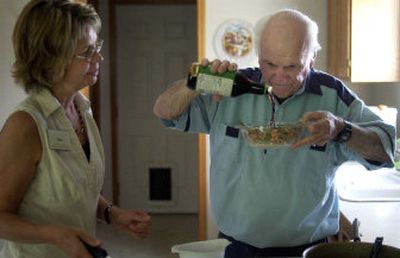Here’s to a healthy lifestyle

The walnuts, peapods, red peppers and string beans Pam Wright stir-fried in olive oil didn’t interest Joe Herbert as much as the cucumber he sliced over romaine lettuce.
Still, he ate the stir-fry over brown rice amiably and encouraged Wright to eat some herself.
“That was excellent, Pam,” Herbert said after his last forkful. “You’re terrific.”
Herbert is a vital senior trying to outpace diabetes. His wife cooked for him for decades, but she died 18 months ago. Aging and Adult Services in Coeur d’Alene recently referred Herbert to the University of Idaho Extension’s nutrition program.
The program offers free nutrition education to seniors and people on food stamps, a state food subsidy program. It also offers free nutrition workshops at worksites, a program growing in demand as the nation focuses more of its attention on fighting obesity.
“We teach a healthy lifestyle so by the time a person is 80, he can still put into practice what he learned from us,” said Shelly Johnson, nutrition program administrator.
Ten years ago, North Idaho became the first area in the state to offer nutrition education to food stamp recipients. The idea was to teach people how to get more for their food money by eating fresh, healthy food rather than pre-packaged processed foods.
Nutrition advisers offer six classes that teach the latest recommended portions of the food groups, food safety, menu planning, shopping and cooking suggestions.
Last year, 179 families on food stamps participated. Surveys completed by participants before and after the program showed that 67 percent of the families improved their meal planning and shopping, and lowered the fat content in their diets. Seventy-eight percent added more fruit to their diets, 59 percent added more vegetables and 55 percent began writing a spending plan and sticking to it.
Nutrition advisers spend a lot of time correcting information from the latest eating fad – for example, eliminating carbohydrates to lose weight, Johnson said.
Aging and Adult Services in Coeur d’Alene asked Johnson three years ago to offer its nutrition services to seniors.
“We find with that generation that a lot of women were used to putting large meals on the table. Now it’s just them and their spouse and it’s tough,” Johnson said. “They don’t want to dirty a lot of dishes. We teach mini-meals.”
Nutrition is a major problem for seniors tired of cooking, with small appetites, living on tight budgets and, often, inactive, Wright said. Poor nutrition can lead to weight and strength loss, lower immunity to disease, depression, confusion and disorientation, according to the nutrition program curriculum.
Since 2002, 144 North Idaho seniors have participated in the nutrition program. According to surveys, they’ve nearly tripled their understanding of the connection between food and their health.
Physical problems and near blindness limited Herbert’s activity and his disinterest in food prompted him to skip meals. Aging and Adult Services signed him up with Meals on Wheels, which delivers six balanced meals each week to him.
Wright taught him to make quick crockpot meals, stir-fry and a snack with yogurt, graham crackers, fresh peaches and cashews. She brought the cooking ingredients with her and she encouraged Herbert to eat small amounts of healthy foods throughout the day.
“I’m trying to eat more often,” Herbert said as he helped Wright store his stir-fry leftovers for another meal.
Mostly, he appreciated Wright’s company and she liked knowing he was eating better.
“I love seniors,” she said. “I’ve never had a bad experience.”